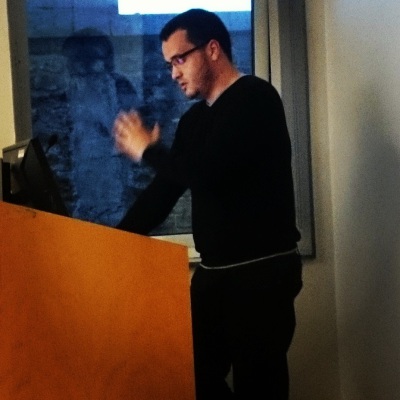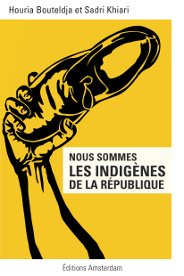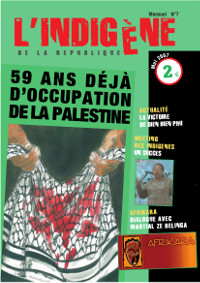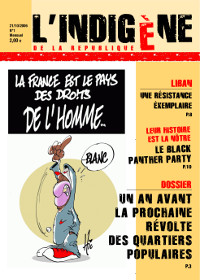This Paper was presented during the Eleventh Historical Materialism Conference in London (“How capitalism survives”). It was presented in the Panel “Race matters” with Satnam Virdee (“A Marxism without guarantees: Stuart Hall and why race matters”) and Alberto Toscano (“Du Bois, Race & Class and 1914”).
I would like to thank Sadri Khiari, Félix Boggio, Stella Magliani-Belkacem, Stefan Kipfer, Dyne Suh, Benjamin Opratko, Matthieu Renault and Morgane Merteuil for their help.
Preliminary comment : the word “indigène” is not easy to translate into english without emptying it of its political substance. But even if “indigenous” is not the best translation for the french word “indigène”, I will use it here for reasons of simplicity, as the party I will speak about is called Parti des Indigènes de la République. But keep in mind that the French word is referring to the concept of the colonial-subject.
In January 2005, several anti-racist activists and organizations sent out a call – l’appel des Indigènes de la République. This call was sent out in a context of very strong racial tensions in the French Hexagon : girls wearing hijabs were thrown out of school (2004 – but this issue goes back to the 1990s), the French banlieues were rising up (2005), etc. … The aim of this call was to mobilize activists around the balance of forces deriving from the colonization. Thus, the call was saying that “France was a colonial state, France remains a colonial state”. This call received around 3000 signatures in a few weeks. After this call the Movement of the Indigenous of the Republic (M.I.R) was created, an organization that intended to be a political one; and it’s exactly the political aspect of the mobilization of non-white in France that I will focus on here.
In his book Pour une politique de la racaille, one of the founders of the M.I.R, Sadri Khiari, wrote that “indigenous people cannot enter the political life unless they break into it themselves”. This willingness to leave the non-profit sector (milieu associatif) and to politicize the immigration struggles resulted, in 2010, in the creation of the Party of the Indigenous of the Republic (P.I.R). The P.I.R introduced into the french political field a new analysis of the racial question by analyzing it from a materialist and political point of view, leaving the “moral sphere” where most of the “analysis” of racism in France were confined. The aim of this paper is to present the main political lines of the P.I.R, but also to emphasize the necessity of such a party in France. As I don’t have much time, it is impossible to fully represent this organization, but for those who can read French, you can refer to the writing of Sadri Khiari – the main theorist of the P.I.R. I will simply organize my presentation into three main points :
- The building of an autonomous political force
- The introduction of the racial question in the french speaking political field.
- What political perspectives for the future ?
- The building of an autonomous political force
What gives the P.I.R relevance is, first, that it has left the “classical” political field (what the P.I.R calls “the white political field”) and, thus, its need to politicize the antiracist struggles on an autonomous way in France. Of course the M.I.R/P.I.R isn’t born ex nihilo but comes from a long tradition of struggle from non-white in France. In order to save some time, I will not cover the whole history of these struggles, but I will just quickly evoke a certain continuity in the relation of the French colonial-subjects to politics. In his book Pour une politique de la racaille, Sadri Khiari comes back to the “indigenous status” relating to the colonized Algerians set up in 1865, giving French nationality to the colonial subjects but still excluding them from political life (as they had no political or civil rights). But, Sadri Khiari wrote, “All this does not only belong to history. A whole part of the population, living and working in France, is still deprived of citizenship.” (p. 53). In the same way, the descendants of migrants, who have French citizenship and have more rights than their parents, still stay outside of the political life, and as a result, their political priorities are never taken into account. The attempts to use the law for inciting non-white to vote or to enter in the “classical” parties or trade-unions proved themselves to be useless. What is criticized by the P.I.R is that the french radical left is taking non-white people into account only as part of the “universal” struggle of all workers but in the same time does not take into account the specificity of their racial oppression. The relationship between non-white and the french left is a relation of simultaneous inclusion and exclusion. Their are included in the political struggle as workers but in the same time they are excluded from it because their social specificity – the race oppression – is not taken into account by the french radical left. This is what the P.I.R calls the “white political field” : a political field which excludes the specificities of the oppression of non-white. And this is why the P.I.R was created in France, as Sadri Khiari wrote:
“The Party is an answer to the fundamental burden for the indigenity (indigénat). The main burden for the indigenity today isn’t so much the fact of being discriminated in this or that place or being insulted on TV; the main burden of the indigenity is the fact of being expropriated of any political power : it’s the exclusion from the political field, of its mechanism, of the definition of its norms and institutions.” (Nous sommes les indigènes de la République, p. 224)
In France, it is often reproached to non–white that they do not politicize themselves and this “non-politicization” is often explained by a strict individualistic decision. The aim of the M.I.R was to counter this, by creating a political organization dealing with the priorities of non-white in France. This aspect is very important if one will understand the sense of the word “autonomy” relating to the M.I.R/P.I.R*, which implies a sort of “political re-territorialisation”. The watchword leading the autonomous strategies of the indigenous struggle was this quote, by the famous Algerian sociologist Abdelmalek Sayad : “Existing means existing politically”[1], it was thus a necessity to build a specific organization, even if it implies that the M.I.R/P.I.R should distance itself from some organizations of the French left. Of course, this autonomous existence does not result immediately in a political party for non-white. The change from the M.I.R to a political party (P.I.R), in 2010, specified the sense of autonomy and political use that could be made of it by the colonial-subjects in France. It does not mean an “NGO autonomy” that would aim to change just several particular aspects in the society, but it means the building of an indigenous political subject aiming to overturn the racial relations of forces in France. In a interview with Félix Boggio Éwanjée-Épée and Stella Magliani-Belkacem, Sadri Khiari explains that “autonomy is part of the balance of forces”[2] :
“Any organizational action we take, any thinking independence we have, it’s only a certain balancing of power that enables us not to be subjected to the will of others.” (p. 35)
The issue of the relation to the white political field is then very important for the P.I.R. We can also find in many texts of the P.I.R a sharp criticism of “integrationism”. But this criticism was often perceived as a criticism of certain individuals, targeting integrationist or assimilationist attitudes of certain non-white that wanted to be more white in giving French names to their kids, eating pork, forgetting the culture of their parents, etc. … But this criticism of integrationism goes much further : it cannot be separated from the criticism of the french Republic and of the attitude of indigenous people to this Republic. This brings me to my second point
2. The P.I.R and the race question
It could be useful here, to remember that in France, the republican ideology tends to deny race and class social relations. According to the republican ideology, there are only individuals and the Republic offers them equal opportunities. Yet, it would be wrong to say that the ideology of the holy-Republic produces by itself the racial relations in France. The Republic is rather an ideological form that is taken as a result of the material privileges of white people in France. Yet the French radical left has never felt comfortable with the “race” concept and has long seen racism as either just “bad ideas” or as a “simple” obstacle against the unity of workers. However, it seems that recently, the concept of “social race” as a strategic and political concept has become more and more popular in the french political struggles. The P.I.R has something to do with the rise of such a materialist analysis of postcolonial racism. On this topic, the book La contre-révolution coloniale en France by Sadri Khiari appears to be a classic among the works written in French. Many points are evoked in this book and influenced the P.I.R, but I will simply speak about two of these points : the continuity from the colonial to the post-colonial situation and the second point will be about State Racism. Khiari insists that “post-colonial relations are characterized not only by their historical roots in colonial history but also the differentiations and hierarchies constructed according to racial, ethnic and cultural criteria”. Post-colonial racism itself is not a matter of representation only. But it contributes to a post-colonial situation which is organized in its social, economic, institutional and cultural dimensions. Here, I will quote a pretty good article, written in english by Stefan Kipfer : “Decolonization in the heart of empire : some Fanonian echoes in France today” (2011) :
“Khiari adopts an integral conception of (post-)colonial relations as multiform, ideological, cultural, social and economic at the same time. (…) Of course, the post-colonial situation is no carbon copy of the colonies. Khiari detects a shift in the scale and intensity of violence which shapes colonial social relations. While mob and police violence continues to shape post-colonial relationships, these relationships are more pervasively mediated by “legitimizing institutions” than was the case under formal colonial rule (Khiari, 2006, 113). It thus matters that today, the modality governing the ‘indigenous’ of France is implicit and informal, not legal and codified (Bouteldja, 2008a). Khiari also points to the fact that in France itself, people with family ties to the former colonies are in a demographic minority. As a result, the lines of demarcation between “native” and “non-native” are more porous than in formal colonies (2007, 24) and social relations in the metropole must be analyzed with particular care to isolate their specifically post-colonial aspects.[3]”
The other aspect which is very important for the P.I.R and which was developed by Sadri Khiari is that the anti-racist struggle can only develop itself against the State, as the latter guarantees the existence of white privilege. The existence of the social races, and the “autonomous life” that acquires the balance of racial forces, is always linked to the State. Some example of this (but they are many other) are : the girls who cannot go to school with their headscarf (this law was supported by a whole part of the french left), young non-white boys who are killed by the police, the support from France to the Zionist State, etc. … Thus, State-racism is central for the P.I.R.
Yet, some parts of the French radical left sometimes accuse the P.I.R of not taking the class struggles into account. The P.I.R refuses any lessons coming from the left concerning its political attitude particularly because antiracist organizing is always asked by the left of positioning itself on the class struggle before it can engage itself in antiracism. It is clear that race is the central axis of the political project of the P.I.R, but it is so because the French radical left often perceived capitalism just through the relations of production and did not take into account the racial ranking of the workers and the way their racial privilege contributes to this ranking, and vice-versa.. What is important for the P.I.R is to build a political strategy, from which it could question the issue of social change from a decolonial point of view and this implies the autonomous organizing of the colonial-subjects, regardless of their attitude on class struggle – but, it is important to say that the P.I.R never allies itself to bourgeois parties, simply because it never meets such parties in its struggle. During a long time the word “race” was absent from the political vocabulary of the french left and if the word “race” is not that shocking in France today, as it was a few years ago, it remains true that when one speaks about race, he does not speak about it as a power relationship between white and non-white or as a social and political struggle between them, thus emptying this word of its meaning. It is therefore from this analysis of the race struggle that comes the creation of a movement, then a party, of the colonial-subjects in France. Now, I will come to my third and last point : the perspectives for this political organization.
3. What perspectives for the future ?
It is important to grasp that the P.I.R is a very young organization and that it suffers from weakness on some points. It’s a common objection to the P.I.R that race is not the only form of struggle line in France, that France also has gender and class lines. All this is true of course, and the P.I.R knows that. But the main question for any political organization is precisely this : how can we fight against the multiplicity of contradictions that structures society, not abstractly but by means of politicization? The P.I.R does not want to make an entirely separate indigenous-leftism and does not refuse to ally with organizations from the radical left on some points. Because, as the P.I.Rs struggle is a fight for power, we should not forget that this fight is done in a dialectical relationship with the radical left organizations. If we want to take into consideration the plurality of capitalist relationships, it seems that struggle should accept organizations like this which permit the political existence of non-white. Indeed, in the imperialist states the working class should accept to ally itself with other social sectors, including those who didn’t avail themselves from the class struggle. Because, even if the P.I.R is autonomous from the white political field, some of their goals overlap with the radical left. To the question of alliances between the P.I.R and the french radical left, Sadri Khiari wrote in 2009 (one year before the creation of the “Party of the indigenous of the Republic”) :
Our priority (…) is (…) to gather the indigenous and to build their political independence and, when the time comes, I guess that we will be open to any forces that will respect our autonomy and that will engage themselves in a decolonial perspective for real, and not just intermittently.[4]
However, one of the main obstacles to such alliances has long been the attitude of a whole part of the radical left towards the M.I.R/P.I.R. When Houria Bouteldja, spokesperson of the P.I.R, speaks about the critics made to the M.I.R by the left, she speaks about the need, for this left, that the M.I.R (but it is also true for the P.I.R) has a “perfect” attitude on every single level. It seems that the non-whites need the approval from the white to engage in politics.
The radical left, quite islamophobic and extremely secular (laïcarde) was criticizing us, ideologically, let’s say. The radical left asks us (…) “Who are the whites?”. They criticize us on communautarism (“cultural sectarianism”), on identitarian closure and many other things : “You are not clear enough on antisemitism, you didn’t take in account the class struggle, etc.”. Given the question of our organization it was like “and which role should the whites play?”, “Why are you building a movement? Why not creating simply an informal network?”, “Why do you organize yourself?”, “Why do you need a separate movement?”. (H.B, Nous sommes les indigènes de la République, p. 30)
One of the main obstacle to such alliances has long been the leftist attitude of certain streams from the radical left which were looking for the “purity” of the class struggle and saw the M.I.R/P.I.R as a “racialist” and “culturalist” movement. But it is also important to say that this attitude has evolved. Even if a part of this left still does not admit the importance of the P.I.R, some left organisations in France recognizes the legitimacy of the P.I.R on several issues. Thus, in 2009 for example, the M.I.R was excluded from pro-palestinian demonstrations because of its support of the Palestinian resistance, but in 2014, during the last demonstrations for Palestine, the P.I.R was one of the main organizers and functioned as a serious interlocutor in much of the french media. During this demonstrations, it became obvious that the P.I.R and a part of the radical left are working together on some issues. The support to Gaza is a very good example of this, because the P.IR was part of the informal group – the “Gaza Generation”[5] – who organized the Demonstration, with some palestinian organizations (GUPS-Paris – Union générale des étudiants de Palestine – , PYM-France – Mouvement des jeunes Palestiniens –, Génération Palestine and the Fatah-France), and some organizations like the Jewish Union For Peace (UJFP) and the Nouveau Parti Anticapitaliste (NPA). In the same time an other group was created – the collectif national – who was composed of organizations of the left considered as less radical on the palestinian question. Two of the demonstrations organized by the “Gaza Generation” were cancelled[6] but the demonstrations organized by the “official comity” were allowed. The government tried to divid the pro-palestinian movement into two groups : a radical one and a moderate one. But it didn’t work ! When the Demonstrations were banned, the P.I.R, the N.P.A and the Jewish Union for Peace were still calling to the demonstration but also Ensemble (part of the Front de gauche) and two other organizations – the Communist Party and the “collectif national” – sharply criticized the banning of the demonstrations.
To sum up, then : autonomy does not mean that the P.I.R hasn’t a strategical vision, the P.I.R can build alliances with other political groups. But the building of a larger political bloc should override some disagreements. If the autonomy of the P.I.R is respected, then a common struggle could be built on sound basis. The exit of the white political field is therefore a necessary prerequisite to the struggles of non-white people in France, but paradoxically, it also appears as a necessary prerequisite to the constitution of a larger political force fighting in order to reverse the multiplicity of domination relationships that structure the society.
Of course the P.I.R is a complex party and to analyze it completely would imply to spend much more time on the many texts that constitute its foundation and on the almost ten years long experience of the M.I.R and the P.I.R. I’ve tried to present the most important political claims of the P.I.R and its place in the political struggle in France and my comments are far from complete but I hope they have allowed me to present this political force to a non-french public.
Selim Nadi, membre du PIR
* One should not understand the vocable “autonomy” in the sens of anarchist or antifascist activists.
[1] Abdelmalek Sayad, L’immigration ou les paradoxes de l’altérité. 2. les enfants illégitimes, Raisons d’Agir, 2006.
[2] Houria Bouteldja et Sadri Khiari (dir.), Nous sommes les indigènes de la République, Amsterdam, 2012.
[3] Stefan Kipfer, “Decolonization in the heart of the empire : some Fanonian echoes in France today”, http://indigenes-republique.fr/decolonization-in-the-heart-of-empire-some-fanonian-echoes-in-france-today/
[4] Sadri Khiari (interview with Danièle Obono), « Le P.I.R est avenir », http://indigenes-republique.fr/entretien-avec-sadri-khiari-le-p-i-r-est-avenir/ (2009)
[5] See Houria Bouteldja and Youssef Boussoumah, “Génération Gaza 2014: enjeux et stratégies”, http://indigenes-republique.fr/generation-gaza-2014-enjeux-et-strategies/
[6] See Richard Seymour, “The Anti Zionism of Fools”, https://www.jacobinmag.com/2014/08/the-anti-zionism-of-fools/








